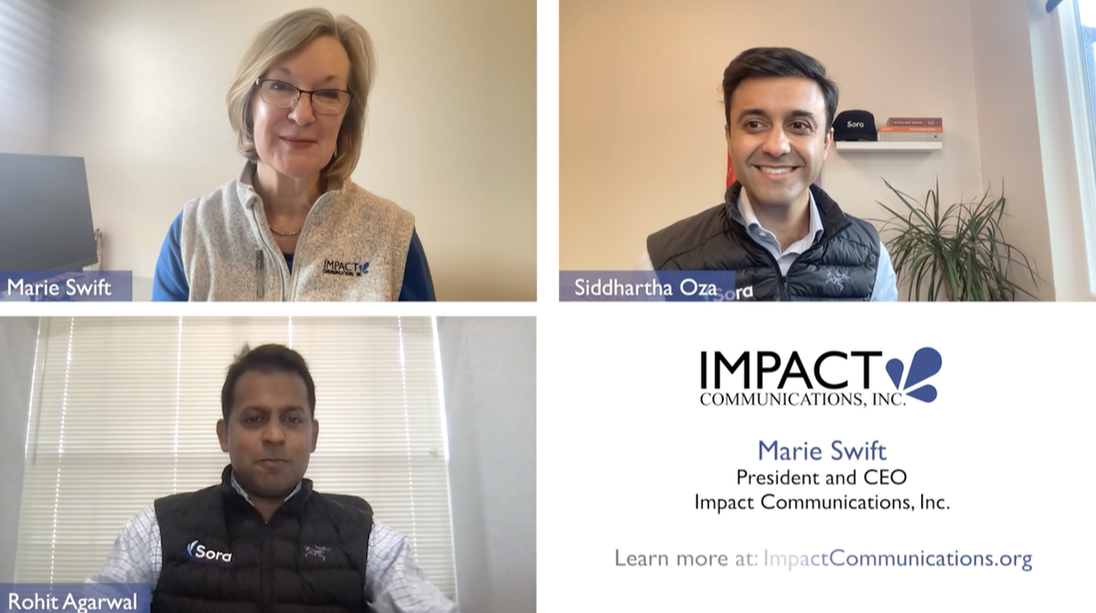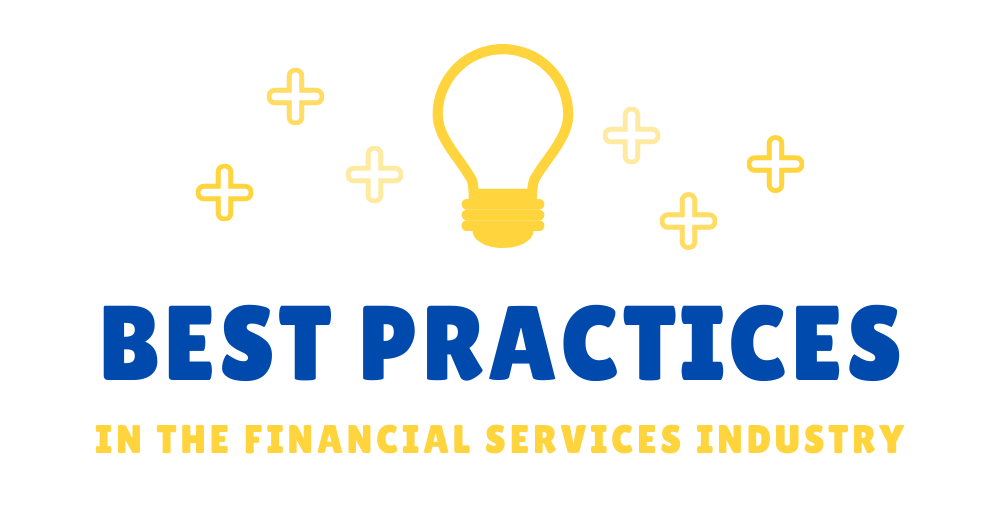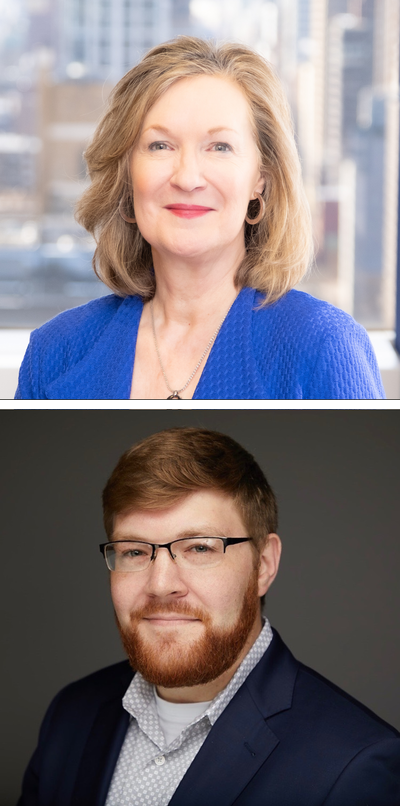Swift Chat with Siddhartha Oza and Rohit Agarwal: Liability Optimization with Sora Finance12/5/2023
In this Swift Chat, host Marie Swift speaks with Siddhartha Oza and Rohit Agarwal, the co-Founders and co-CEOs behind Sora Finance, whose mission is to optimize debt costs for everyone by empowering advisors in actively managing clients' liabilities.
The Sora platform, driven by an AI component, addresses the historical oversight of managing debt, providing advisors with the right data and tools to optimize clients' financial well-being. The trio discusses the complexities of managing liabilities for UHNW and HNW clients, the untapped potential of debt optimization, and the pivotal role financial advisors play in reshaping the landscape of wealth management.
Learn more about Siddhartha, Rohit, and Sora Finance at www.SoraFinance.com Our mission at a high level is to give everyone the lowest possible cost of debt. Or rather can we always have your debt being optimized." ~ Rohit Agarwal, co-founder of Sora Finance Transcript of Conversation
Marie Swift: Hello, and welcome back to another great Swift Chat. I'm your host, Marie Swift, and I'm joined today by Siddhartha Oza and Rohit Agarwal; they are the Co-CEOs of a very cool solution for financial advisors and financial professionals: Sora Finance, and we're going to talk about that today. But my first question for you, gentlemen, is about your mission. Could one of you please tell me about your mission and why you decided to provide this solution for advisors?
Rohit Agarwal: Yes, thank you, Marie. I can jump in on that one, and thanks for having us. We're really excited to chat with you. Our mission at a high level is to give everyone the lowest possible cost of debt, or rather, can we always have your debt being optimized? We do that by working with financial advisors and wealth managers. With financial advisors, we really want to empower them to be superheroes, empower them to wow their clients by managing their liabilities. I think many clients come to advisors to grow their net worth, but most advisors today are focused on the asset side because traditionally that's been the expectation of clients. I think our core belief at Sora and how we deliver on that mission is clients are expecting advisors to do more. One big way they can do more is by actively managing their liability side. We've seen that this is appropriate whether you're a high net worth, ultra-high net worth, mass affluent, or any client; many of these clients have a degree of liability. You have a mortgage or auto loan, you might own a business, and business loans, whether they're working capital, the advisor, being a core part of ensuring that it's optimized for your personal situation and financial goals, can go a long way in helping you grow your net worth. Swift: For sure, I'm wondering how you even came up with this idea. What's behind this? Maybe the backstory would be helpful. Siddhartha, do you want to jump in on that? Siddhartha Oza: Happy to, thanks Marie. We started this off with a recognition that managing liabilities is complex and time-consuming. As a result, we found that people like ourselves, our families, people we knew, and people we talked to and researched the topic were just leaving money on the table when it came to liabilities. We grew up with the mentality of a penny saved is a penny earned, and so when you look at liabilities, there's a real opportunity to turn those savings into assets. With that recognition that managing liabilities is complex and time-consuming, we also recognized that while there had been technology to democratize the investment or asset side of the equation, there hadn't been much innovation on the debt side, and there certainly hadn't been any kind of technology to enable the type of private banking style experience that ultra-high net worth individuals have access to—and bringing that to more people. And so that's what we set out to do. And we said, here's this opportunity to bring technology, combine that technology, which makes this process so much more seamless in accessing liability data in enabling that liability data to be used to save clients money and combining it with the human-centric advice of financial advisors in the wealth management community to help individuals out. Swift: We've heard for years about held-away assets, and again, back to your point, it's about the assets. Also, you hear the word debt and think, oh, that's for people without any wealth. But what you're pointing to is something entirely different: managing the liabilities as part of the Holistic financial plan. And why hasn't this been done before? Would one of you comment on that? Agarwal: I can jump in and feel free to add on, Siddhartha. I think it hasn't been done before because advisors often struggle to have the right data to act on liabilities. So, when we built Sora, we worked very closely with about 20 RIA’s, and we're saying to these 20 RIA’s, why is it that you aren't managing debt or liabilities? We ran the numbers, and there's so much money left on the table to start at this point. Whether you're getting an interest rate on a new mortgage that's 50 bips higher than you could, whether you didn't refinance when it was possible, and the overarching theme as to why they didn't, is they didn't have the right data. We built a product that I think makes Sora special, which allows an advisor to pull in all of their existing liabilities at a granular level with just one click using client PII. So, for any debt they have, they'll know the interest rate, the term, the monthly payment, and with that information and the outstanding balance, they're able to say, okay, now I have a live look, when can I optimize it, what can I do? Should we collateralize this? I think that's been a big driver. On top of that, it takes a lot of time to build a robust network of lenders to say okay, now I have all the information, I'm running the analytics and insights, and do I have confidence in your scan of lenders that you're going to get my client's great deals. Over time, being able to do that has comforted them using Sora. Oza: I'll chime in with one last piece: at the end of the day, advisors have been pushed loads and loads of new products. And there are a lot of companies out there that are offering new ways for advisors to deliver value beyond assets, which is critical. Advisors can no longer just be doing work on the asset side. There's estate planning, tax prep, insurance, all sorts of things. As a result, more and more of the margin that advisors have been able to capture as a practice has been shrinking. And that's a challenge for the wealth management community as a whole. As we came in and looked at this, we said, how can we do this in a way that's accretive to your practice as an advisor that helps you grow your book? To that extent, what Sora does is help advisors in a couple of different ways, whether it's in some of the revenue sharing on originations of different types of loans, or we have a prospective client debt analyzer that enables advisors to convert clients at a greater clip. Think of it as a sort of Nitrogen or asset proposal generation tool, but now, on the liability side. We're able also to enable advisors to take those savings that those clients experience on the liability side, where if we encourage them to take an action that results in $1,000 savings a month, well, $1,000 savings a month over the next 30 years of a mortgage, for example, $360,000 if you just sock that away. Not particularly interesting. But if you reinvest that for your client at a 6%, 8%, or 10% return, you're talking about almost a million dollars, which is huge for the client and the advisor if you think about those reinvested assets. Swift: It sounds amazing. Is there an AI component? What’s this magic, the technology behind it? How do you do this wizardry? Oza: There certainly is an AI component. For us, it's really baked deeply into the core of what we do: bringing in the client liability data. We bring in lender rate information, which changes daily and varies across all these lenders. We use our own complex matching algorithms combined with some optimization algorithms to think through the exact ways we can result in savings for clients. And that could be as simple as a rate term refinance, which is not particularly complicated and certainly doesn't require too much AI to figure that out. But it also could be more interesting in the form of cross-collateralizations, for example, using a HELOC to pay off other high-interest rate debt, using that creatively to grow a client's net worth. We also incorporate some generative AI tools into our product to enable advisors to take this complex theory of debt and complex understanding of debt and distill it into unique insights that they can then share with their clients, again, our software is built for advisors. It's built in a way that allows auto-generated reports to take this complex theory, bring it to advisors' clients, and allow advisors to look like the superheroes there. Swift: Well, we're talking about what makes Sora special. Is there anything else you'd like to add about the culture, the product, or the opportunity? Agarwal: Yeah, let me jump in. When thinking about that question, I went back to what are our couple hundred RIAS that are using Sora today saying. How would they describe why they are using Sora, and what makes it special? Honestly, I think what it comes back to is the fact that it was built for advisors from the ground up. We took the product, and we said, how do we integrate it into your workflow and make it as easy as possible for you to do this new thing that you haven't done before? From that perspective, it is really easy for an advisor to say, yesterday I was not managing liabilities; today I am, and here's how I do it, and here's how I quickly differentiate myself with clients. I think what else makes us really special is our culture, to your point, our team believes passionately in this. We think people are often not optimized when it comes to debt. We're passionate about the opportunity, and we really love working with advisors. We think they drive an incredible amount of value for the families they work with, but also, if you came and worked on our team, we're a growing team that's an incredibly learning-based culture, and I think that makes it quite fun to work here in terms of how do we consistently improve the product and or service that we're offering our clients. Swift: Are you East Coast or West Coast? Agarwal: We're on the West Coast, so we're remote. Siddhartha and I are based in San Francisco, and our CTO is also based in the Bay Area, but our company is all over the United States. Swift: You mentioned advisors who are adopting this platform, this solution, and bringing their clients more value. What would you add about advisors? What are you hearing from them as they talk to their clients and use Sora? Oza: I can jump in on that. When we talk about Sora with advisors, there's an inherent sort of nodding that happens where it's really intuitive. Advisors understand it, they look at this and say that part of their stated goal is to help their clients grow and preserve their net worth, and net worth is a really simple equation: assets minus liabilities. You have to be able to look at both sides of that, we explain that, and advisors get it. They're nodding. We love to see that. They sort of say this makes sense, but then the wow moment is when we pull up the product, walk them through the experience of what it's like to use Sora, and the light bulbs go off. There's this element of, I can't believe that this hasn't existed before. It surprises me every time in a way that it really shouldn't anymore, but it really delights me when I hear that and when I see that. I think it's because advisors are able to use Sora in a couple of key ways. They're able to use it to surface opportunities for savings of existing liabilities, as we mentioned earlier. They can use it to engage their clients on credit topics they weren't previously able to. They're able to use it to convert prospective clients like we were talking about earlier, and of course, they're able to use it to support clients on stated lending needs. When their clients come to them now, they're looking for support with taking out a mortgage, a HELOC, or a commercial loan for their small business. Instead of turning them away and sending them somewhere else, now they can actually engage with their clients and truly support them. It's a win for clients, it's a win for advisors. I think it's phenomenal to hear that from advisors who continue to come back to us and refer other additional advisors to us, not for any other kind of fee, but just because they are excited about what we're building and want to see it in more advisors' hands. Swift: Well, you were kind enough to send me a copy of your new white paper, and I read through it last night. Maybe you could talk a little bit about what's in the paper and how our listeners and viewers can get a copy of it. Agarwal: Good. I'll talk about the white paper a little bit. With Sora, we're creating this new service for advisors. It's not saying here's a better CRM that you should be using, it's a whole new topic. The white paper starts on the why behind liability management. It talks about, regardless of your income or asset level, whether it's mass affluent, ultra-high net worth, or high net worth, why does liability management matter. Why does it matter to take a full look at your liabilities, whether they're consumer or commercial, and then work to optimize them and run analytics on them to get the best answer for the client? After that, it goes into the how. Now you've said, okay, I understand why, what's the value at stake for managing liabilities? How can I go about doing it? The white paper talks through the essential elements of what's out there. How can an advisor, if they want to do it, what are they expected to do? Or what can they do? Here are the different components that go into actively managing liabilities, whether it's security-based lines of credit, mortgages, or collateralization. Then, it talks a bit about this component, which I'd say is what wirehouses have. If you are a Merrill Lynch advisor, you kind of leverage Bank of America to do a lot of this for you. We're saying, here's how you can have that same offering. If you manage liabilities in this way for a client, if you're a registered independent advisor or an advisor that doesn't have a bank behind you. Go ahead, Siddhartha. Oza: Sure. We were thrilled to be able to partner with John O'Connell at The Oasis Group and Joel Bruckenstein at T3, and to have Sora be a part of that partnership. You'll find the white paper across those platforms, and we're excited to make that available to all advisors who are excited to read it. Swift: Those are two big names in the wealth management and wealth tech space. John O'Connell at The Oasis Group and Joel Bruckenstein at T3. As you know, the 20th anniversary and the celebration for T3 is happening in January 2024 at the Cosmopolitan, a beautiful resort, very classy, and right on the Las Vegas Strip. I'm looking forward to seeing both of you there, as well as John O'Connell and Joel Bruckenstein. Is there anywhere else our listeners and viewers could find you other than on social media and online? Oza: Absolutely. We're thrilled to be kicking off the year with our visit to T3 in January. We'll be in Vegas and hope to see you there, Marie, and many other of your listeners. In truth, we haven't booked the rest of our conference calendar for 2024 but based on this past year and some of the great conferences we've attended, we expect that we'll be at Wealth Management Edge, Future Proof, XYPN Live, NAPFA, and the FPA conferences, and likely a few others. Swift: As we wrap up today, are there any final words of wisdom or things you'd like to leave as we say goodbye to our listeners and viewers today? Agarwal: Yeah, one last thing. We talk a lot with advisors right now about how we don't know when rates will drop. Is it going to be 12 months, 18 months, or 24 months? But we think there is going to be a lot of lending that happens, whether it's new loans for people that say, I've had a low mortgage rate, and now I'm ready to move, or it's refinancing opportunities. If you want to be a part of that critical decision for your clients, the time to have that conversation is now. It's time to start getting ahead of that. We're preparing for that moment, but we want to put that front and center for advisors. Swift: Siddhartha, you've got the final word. Anything in closing. Oza: I think Rohit's really covered it here. We're really thrilled about bringing Sora out. We've now been operating with between 400 to 500 independent advisory firms. We manage over a billion and a half of liabilities with Sora and to that extent, we've built up this product in a way that makes it seamless for advisors. We're excited to welcome more advisors into the Sora community and help you, help your clients here. Swift: All right, so everybody go and get that white paper, download it, and see what additional insights you can glean on top of this fabulous video interview. Is the website SoraFinance.com? Agarwal: That's right, www.SoraFinance.com. Swift: We'll link it right here in the show notes on my Swift Chat channels as well. Well, thank you, gentlemen. It's been a pleasure getting to know you a little bit more and learning about, I guess you call it, liability optimization, right? It's a new word. We're going to have that roll off our tongues. I love it. Thank you again. Agarwal: Thank you, Marie. Swift: All right, bye-bye. Comments are closed.
|
About
|
|
Stay Connected
|
Phone: 913-649-5009
©2023 Impact Communications, Inc.
|





